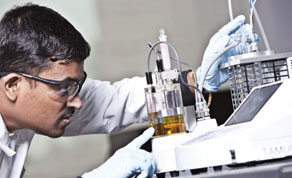 |
| A researcher at work at TAMUQ |
Texas A&M University at Qatar (TAMUQ) will host in its Engineering Building in Education City the Qatar Environment and Energy Research Institute (QEERI) of Qatar Foundation.
TAMUQ will sign a Memorandum of Understanding with QEERI today outlining an agreement in this regard.
TAMUQ dean and CEO Dr Mark Weichold reiterated to Gulf Times yesterday the university’s commitment to serve as a strong partner with Qatar Foundation and create new knowledge in the local community, goals that will be furthered by welcoming QEERI to the Texas A&M Engineering Building.
“The University has been engaged in energy and environment research for several years and plans to continue this vibrant research, drawing on the synergisms that will exist between Texas A&M at Qatar and QEERI,” he explained.
QEERI aims to mitigate climate change and contaminants harmful to the environment as well as contaminants affecting humans.
The Institute’s environmental work focuses on Qatar’s desert and marine ecologies, plant and animal life and air quality.
QEERI’s work on contaminants affecting humans considers issues such as lead and mercury levels in the environment, carbon emissions and other pollutants that pose risks for human health.
Pointing out that TAMUQ is working to create new knowledge through research and collaboration with organisations across Qatar, Dr Weichold stressed that this aim will be furthered by research synergies that will exist between the University and QEERI.
TAMUQ has been contributing substantially for several years to QEERI’s area of study, most notably through its Qatar Water and Energy Utilisation Initiative (QWE).
The research conducted by QWE, heavily funded by the Qatar National Research Fund and other local organisations, examines use of water and energy, focusing directly on projects related to Qatar.
These have included studies of inland desalination, the environmental impact of residual chlorine in seawater and hazardous chlorinated organics found in industrial waste discharge.
These projects are developed in close collaboration with the QWE’s stakeholders and partners, including entities such as the Qatar National Food Security Programme, Ministry of Environment and Qatar Foundation.
Research undertaken by QWE has been strongly supported by the State of Qatar. The Minister of Energy and Industry, HE Dr Mohamed bin Saleh al-Sada, had commented at QWE’s launch that it is a very relevant and crucial initiative for Qatar and the region.
“Building a Qatar-based core group of engineers trained with the scientific and technical know-how to research sustainable, long-lasting solutions to make energy utilisation a reality, I am confident QWE will be a major factor in Qatar’s educational and industrial infrastructure,” he stated.
TAMUQ’s director of development John Small, tied the University’s commitment to being a good partner in Qatar to how it functions at its main campus in College Station, Texas, US.
“Texas A&M University’s main campus in Texas is part of the fabric of the community, offering services to society where there are engineering problems,” he said.
“We are trying to parallel that here in Qatar. It’s more than graduating technically sound engineers; we want to provide services within the community and industry so that they can take advantage of our strengths.”
These services include hosting continuing education programmes and workshops for industry professionals, providing expertise or technological equipment to local industry and partnering with Qatari entities to conduct need-based research.
TAMUQ’s partnership with QEERI is expected to further environmental and energy research in Qatar, propelling the State towards achievement of the Qatar National Vision 2030.

